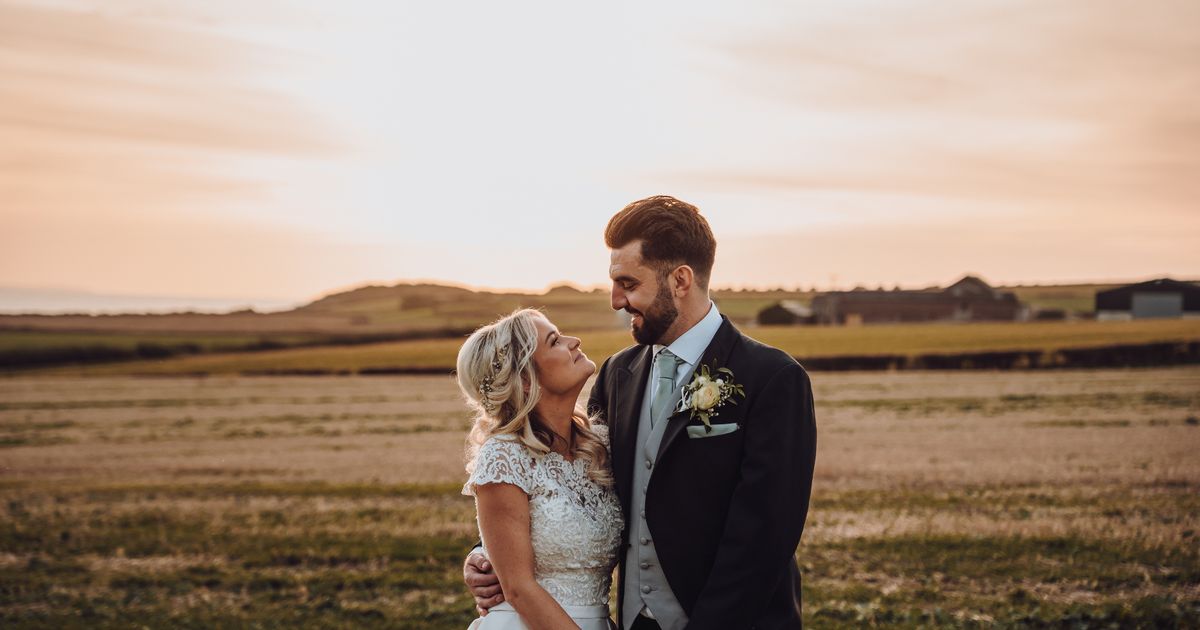‘He just went very weird for like a few seconds and then he’d be fine again, he did that multiple times a day’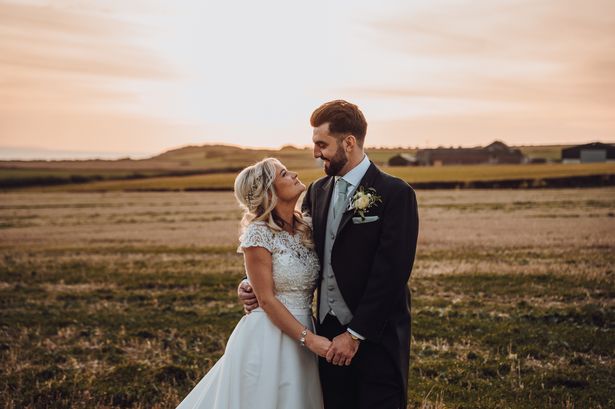 Owain and Ellie got married two weeks after his diagnosis thanks to their family and friends organising the day(Image: Katie Alexandra Photography)
Owain and Ellie got married two weeks after his diagnosis thanks to their family and friends organising the day(Image: Katie Alexandra Photography)
It is just over a year since Ellie James became a widow after her husband Owain died from the brain tumour he had previously defied the odds to beat. Ellie, a mum to beautiful Amelia, who was just 18-months-old when her dad was diagnosed, admits that without her daughter, she doesn’t think she would be here. But her daughter, and now a desire to change the law to help others, are keeping her going in the dark days of grief.
Owain, from Caerphilly, was just 34 when, after a protracted period of tests and scans, a tumour was found. In the initial days after a brain scan, the couple hung onto hope from the consultant’s words that it was “pea-sized” but just a few days later a specialist consultant told them Owain had a 14cm tumour, one of the biggest they’d ever seen.
In the months after Owain’s diagnosis they did everything possible, looking for additional and supplementary treatments, having experimental treatments, going abroad, and even getting married with just two weeks to plan it, only for the tumour to return. It is just over a year since he died.
In February 2022, he began having mini seizures, although they didn’t present as you may expect. “He just went very weird for like a few seconds and then he’d be fine again, he did that multiple times a day,” described Ellie.
Owain was incredibly fit and healthy and they were back and forth to see his GP. The couple were initially told it might be a heart complaint but those checks proved negative.
Ellie remembers mentioning to the GP that Owain’s granddad had died of a brain tumour. “I said, ‘oh, you know, you hear those weird things about young 34-year-olds getting diagnosed with a brain tumour, could it be that?’ and he said, no because he’s not having any headaches”.
The GP put it down to anxiety, but that didn’t tally with his personality. “Owain was the least anxious person you could meet, he was so laid back he was almost lying down and I remember saying to him, ‘you must be anxious about something, tell me what it is’.”
In August that year he began getting headaches, so went back to his GP. where he was given paracetamol and sent home. But one night his headache got so bad, he couldn’t get out of bed, so Ellie took him to The Grange University Hospital and refused to leave until he had been given a brain scan.
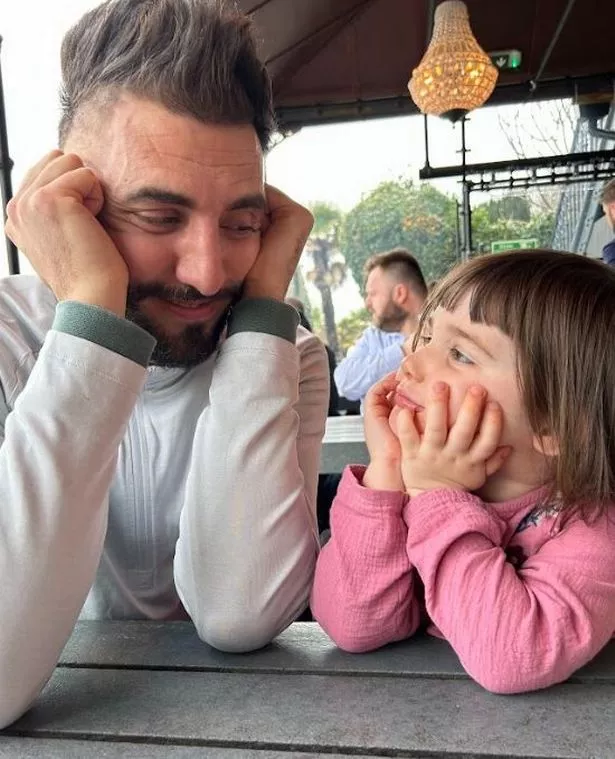 Owain and daughter Amelia(Image: Ellie James)
Owain and daughter Amelia(Image: Ellie James)
However, the hospital’s A&E got so busy, all visitors were told to leave so Owain was alone when he was told a tumour had been found.
“Owain was just completely in a daze,” she said.
They were told the tumour was cancerous but pea sized. “We kind of really held on to that thinking ‘it’s the size of a pea, that’s fine’.”
They had to wait for the weekend before meeting a neurological specialist. That consultant told them it was one of the biggest tumours they’d seen and was 14cm, not pea-sized.
Owain broke down when he was told. Ellie was stoic, telling him it would be fine. “He was told he would have a few weeks to live had he done nothing, so if we had left it to the GP, he probably would’ve died,” she said.
Within days Owain had emergency brain surgery and half the tumour was removed something that gave them all a boost because something was being done.
His care was then transferred to Velindre, and he had chemotherapy and radiotherapy at the Cardiff hospital. But, the couple made it clear they didn’t want to be given a prognosis. “That would give us the impending doom,” explains Ellie. “Owain would decide when he would die. I spoke to the oncologist privately on my own and asked what would happen, was there even a tiny chance of getting rid of it? She told me it would not reduce in size, all it would do was hold it back.”
Ellie asked if she could have any hope at all it could reduce, “she told me ‘absolutely not’.”
The couple went on to look for more treatments beyond the so-called standard, something they felt angered medical staff as it went against their advice.
Yet Owain was showing no symptoms. “You would never have known he was ill. It was in the right side of brain so it didn’t affect mobility, you honestly wouldn’t have known there’s anything wrong with them. All they said was that it would stay at 7cm until it starts to then get bigger again.”
In and amongst all this, the couple, who at this point had been together for a decade, got married. Just two weeks after his diagnosis and the majority of their day had been planned for them.
They turned up to a venue which happened to be available, so they booked it, she went to a wedding dress shop and saw a sale dress she loved, which she bought, but that was it. Their family and friends planned their perfect day, which, thanks to a friend of a friend who also had a brain tumour, involved a helicopter arrival for Owain. “It was phenomenal,” she said.
They asked for no presents, but donations to fundraise towards treatment Owain would need, raising around £10,000 in that first fundraising effort alone.
Away from hospital they started doing everything they could. “Owain completely changed his diet and went on a quite strict keto diet. He was taking around 100 tablets a day, a mixture of supplements and drugs that we found off label, we had appointments the whole week.
“I was injecting him with mistletoe, which boosts your immune system three times a week. He was having IV drips of vitamin C and then we found this vaccine, which basically uses your tumour tissue and mixes your tumour tissue with your dendritic cells, which is part of your immune system in a petri dish.
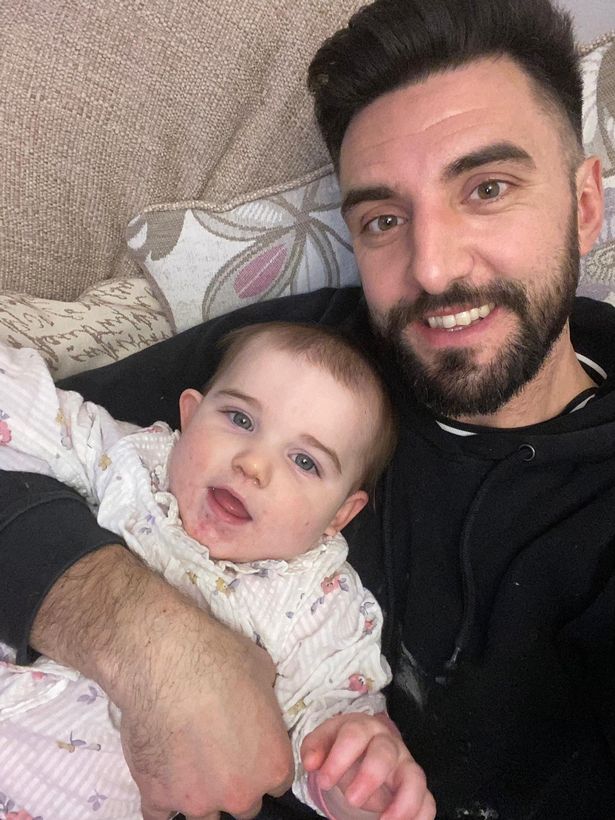 Owain with his daughter Amelia(Image: Ellie James)
Owain with his daughter Amelia(Image: Ellie James)
“It kind of educates your dendritic [immune] cells to the tumour cells and educates them that they’re bad, and then when re-educated, they will then be reinjected into your body so they can find them in your system and kill them basically.
“It’s a really, really clever immunotherapy but you need tumour tissue for it. We thought we had a lot of tumour tissue because Owain had had 7cm removed, but we found out when going through this process that he only had 1cm of what’s called fresh frozen, the other 6cm had had a chemical put on it.”
The more tissue there is, the more vaccine you can have, Ellie explained. For this one, the expectation is for six in the first year and two the years after. Owain got three, the minimum they could do.
There was, and is, no standard conversation about tissue at the point of surgery, Ellie says. They weren’t told about it and only discovered it through their own research and were, she says, discouraged from pursuing the vaccine because it is experimental.
“The problem is these brain tumour patients live on an average 12 to 15 months, so they don’t have time to wait for the NHS to come through,” she said, explaining why they took the approach of trying anything they could.
“I said to Owain ‘I don’t care if this vaccine gives you an extra week, I will sell my house to get you that extra week’ Money means nothing when you’re in that kind of situation.”
The month after his first three vaccines had been administered in February 2023, he had his first scan since his surgery. “The 7cm tumour that was there in September had completely gone by February, which is unheard of in brain tumours.”
In the moment, which of the things had done that wasn’t the concern to them, they were just overjoyed it had worked.
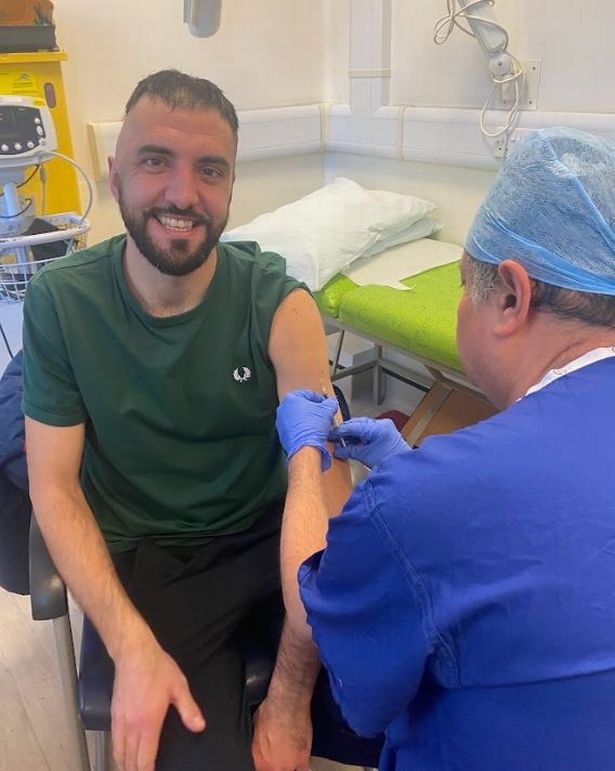 Owain receiving treatment(Image: Ellie James)
Owain receiving treatment(Image: Ellie James)
He then had nine good months and a completely normal quality of life. He could still run a 5k in 20 minutes, and play football, his wife said. “You would never have known there’s anything wrong with him,” Ellie said.
He had six more months of chemo and continued with the experimental care but in December his tumour came back, spotted when a shadow was picked up on his three-monthly scans.
They went to Germany for treatment, but it was a really aggressive tumour and by the time they got there, it had grown 6cm in eight weeks so they recommended a Turkish surgeon who removed it. They were then continuing to go back and forward to Germany for oncolytic viral therapy.
They tried to get more vaccine made from his tumour, but his condition deteriorated too quickly.
By May it had grown another 6cm, so he had another surgery, which saw 90% of it removed, but after that he was no longer the same, Ellie admits.
“Within six weeks had taken over the whole left side of his brain and he died very quickly.
“I made a vow that I would stay out in Turkey to get a treatment plan, and then I would copy that treatment plan and have it done over here, so we stayed up there really until the very last minute that we could. We came home on Friday and he died on the Wednesday.
“It was horrendous. The last two weeks of his life were probably the worst. He went downhill really suddenly. It was like dementia, all in two weeks. One day he couldn’t speak. The next day he couldn’t walk. The next day he couldn’t see. It was like sudden, daily. I do look back and think, actually, that’s the way he would have wanted it. He wouldn’t have wanted to have been stuck in a wheelchair for months.
“I’m pleased that he had an amazing quality of life because you do see a lot of brain tumour patients who don’t. And we were really big on trying to reduce the his steroid use, which I think does impact your survival and most end stage brain tumour patients have hugely swollen faced. He looked phenomenal. I mean, I would say he looked better on his deathbed than he did when I’ve seen him with some hangovers.
“So I look back I think ‘the doctors were wrong. What we did was the right thing to do. And who were they to tell us that we shouldn’t be doing it?”
Ellie admits that the reality of what they went through has only just hit her. She took the lead in terms of medical appointments. “Owain didn’t want to know about the tumour, so I just took over and I was I was completely his advocate. For him, that’s what he needed. He needed someone to do it for him, he couldn’t cope with it.”
In the immediate aftermath, it was their daughter that kept her going. “I honestly believe if she wasn’t here I wouldn’t be either, but she is, so I have to get out of bed for her”.
Her focus now is a new law, on behalf of the club she doesn’t want to be in – those linked with brain tumours.
“What makes me really mad is just had we known that information about freezing chamber. I believe Owain could still be alive today had more of his tumour have been frozen he could have had more vaccine and be alive today.”
She tried to enter the NHS complaints system over issues she saw with their care, but has decided to focus on the political route, to try get the law changed for Owain.
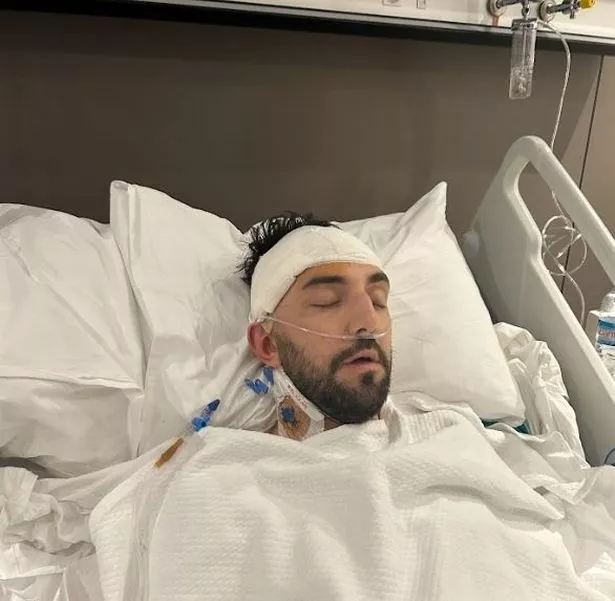 Owain having received some of the treatment for a tumour(Image: Ellie James)
Owain having received some of the treatment for a tumour(Image: Ellie James)
Her dream is for Owain’s law, so that when you have surgery you are told about the implications of histology and what that means so you are giving informed consent.
“I also feel like any tissue that’s taken out of your body, but obviously we’re just talking about brain tissue in this circumstance, is yours, it belongs to you so therefore, you need to consent to what happens to it. And then the other part is the minimum amount should be used for histology, not 90% of what’s there. and then the rest of it should be fresh frozen as a standard so it’s preserved in the freshest way possible and you can use it then for whatever you like. So you could use it for treatment like we did or you could use it for research or more testing. It’s the the patient to choose”.
There is not, she says, precedent elsewhere in the world, but is something brain tumour charities are backing via her petition which she is keen for as many people as possible to sign.
She has pursued it in the Senedd, with the help of her local MS Hefin David. However, the health secretary Jeremy Miles seemed to oppose it. “The introduction of a statutory requirement to fresh freeze all brain tumour tissue, in the Government’s view, risks unintended consequences. Clinical teams already use their expert judgment to balance diagnostic needs with the potential for research and novel therapies. Overriding that clinical discretion through legislation could compromise timely diagnosis or create conflict where tissue volume is limited, which is why the Government does not believe that the case is made for legislation,” Mr Miles told the Senedd.
Ellie said: “What worried me about what the health secretary said was that clinicians are there to use their discretion and by having Owain’s law we’re going to encourage disagreement between medics and patients.
“That’s so wrong about. Using the words ‘clinical discretion’ in health care, I think, is scary. So one patient may have it, and another won’t based on which clinical person you see and what decision they make, is so wrong.”
She has been left disappointed after understanding she would be invited to meet the health secretary, that a formal meeting has been declined.
“We live in a democratic society, if I want to go out and do other stuff, I can. That’s absolutely my prerogative to do that and I should be able to do that without anyone holding us back. That’s just not the case in the NHS at all.
“The gold standard of treatment for brain tumours has been in place since the 90s. It’s not a gold standard. and glioblastoma was found in 1926 and at the time, average survival was 12 months well, it’s now 12 to 15 months average survival,” she said, saying it is the cancer with the least funding, and is considered a rare cancer. “But it is actually the biggest killer of adults under 40 and children,” she said.
